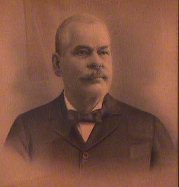
THE WILSON BOHANNAN STORY

Wilson Bohannan
Wilson Bohannan, the founder of the enterprise that bears his name was born in 1829, in Montpelier, Vermont. When still quite young it was recognized that he possessed a marked ability for mathematics, also a passion for mechanics that bespoke the genius. These mental attributes awakened within him a desire, a labor of love, that was manifest in the continual designing and inventing of simple mechanical locking devices.
Later, perfecting his earlier attempts, he produced various kinds of locks that would be practical in operation; simple, still true in their mechanism; that would stand up under the strain of continual use, and that could be manufactured and marketed with reasonable economy.
So pronounced was his native ability in mechanics developed, that at the age of twenty years he was invited to join a partnership, thus creating the firm of Bohannan & Gibson, located in the city of Baltimore, Maryland. It is unnecessary to state that the sole activity of the infant firm centered in the invention and manufacture of lock and bolt devices of all kinds.
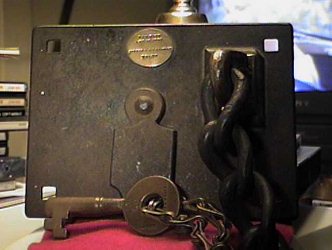
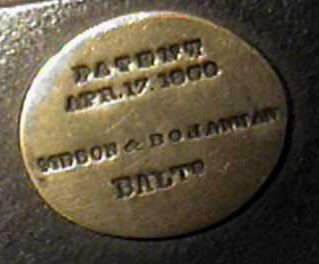
Gibson & Bohannan Stage Coach Lock Patent Apr. 17, 1860
The following year, 1849, the
lure of nature's golden treasure-house, California, beckoned, and like
countless other young, normal Americans of the time, the youthful members
of the firm of Bohannan & Gibson, succumbing to the ravages of "gold
fever", closed the doors of their modest shop and set off for the metropolis,
from whence they departed for the Pacific slope's gold fields, taking passage
on a merchantman, sailing the long, slow route. around the "Horn".
Shortly after arriving in the
Territory of California, the young adventurers began prospecting, and were,
as they thought, standing on the threshold of wealth, when Mr. Gibson was
taken seriously ill.
One has but to turn to the pages
that the immortal Bret Harte's lucid pen has filled with tragic and pathetic
work-pictures to realize the fact that the bonanza towns or mining camps
of 1849 offered little that could nor would aid a man that was stricken
by a serious illness. Fate made their decision clear: If Mr.
Gibson was to survive, he must go where competent medical attention could
be obtained and that place was home.
The return from the Californian
gold fields was made in a coastwise boat to the Isthmus of Panama, which
wilderness was crossed with difficulty, then by sailing vessel to the port
of New York, thence to the City of Baltimore, where, later, the partnership
of Bohannan & Gibson was dissolved.
Wilson Bohannan, with his wife
and family, then came to New York City, where he took a position in the
experimental department of a manufacturing company of world-wide reputation.
Later, he resigned to resume practice as artificer with a large lock manufacturing
company.
Ambition, as restless as the
tides of the seven seas, surged within him, and prompted by a desire to
own his own business, in 1860, he erected a small workshop in the rear
of his Brooklyn home, and there, assisted by his son, Wilson Todd Bohannan,
a youth of fourteen years, laid the cornerstone of the present corporation.
The venture was successful and
enjoyed a slow, healthy growth, until it became necessary, in 1870, to
move to a larger quarters at the corner of Broadway and Kossuth Place,
Brooklyn, New York, where locksmithing was practiced on a more pretentious
scale.
In 1888 it was found necessary
to erect, on Lexington Avenue, Brooklyn, the first unit of the present
group of buildings that are now occupied by Wilson Bohannan, Inc.
Subsequently, as the growth of
the business demanded, new units were added to the original building, until
to-day, we boast of a pretentious plant, including a large brass foundry,
equipped with every modern device, machine or tool that ingenuity has contrived
or that trained mechanical engineers have evolved for use in the manufacture
of lock or bolt mechanisms.
On February 22, 1896, at
the age of sixty-eight, the scepter of life slipped from the toil-hardened hands
of Wilson Bohannan who left his ample estate and business to his family that its
newer generations might follow in the path he had blazed.
In 1901 the business was incorporated,
the stock being allotted to his heirs, who, controlling the management
of the new corporation, took upon themselves
anew, the task of continuing the sterling standards of practice and code
of ethics maintained by Wilson Bohannan, the founder of the business.
That success, in no small measure, has crowned the efforts
of the present management is evidenced by the tact that the lock market
is demanding more of our products every year. Our wares can be found
in the shadow of the Pyramids: in use in the Andes Mountains of South America;
in demand in the islands of the Pacific Ocean and in the Orient.
Europe has long known their utility; Africa recognizes their worth.
New purchasers come in abundance;
old friends in the States, some of them on our books for the past forty
years, continually repeating their orders, until, to-day, we are satisfying
a world-wide demand for our products. All of which recalls to mind
that:
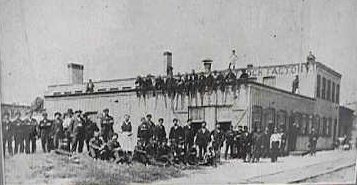
The plant was equipped with
what was recognized as modern machinery: Lathes were driven by foot:
stamping and drilling machines operated by the same power, and at the same
time the building was heated in cold weather by the somewhat now obsolete
method of placing large, old fashioned stoves in the center of the several
floors. After a lapse of three years steam was installed in
the Kossuth Place plant for the double purpose of obtaining motive power
and heat.
The original building contained approximately 10,000
square feet of manufacturing space and was four stories high.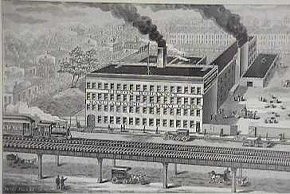
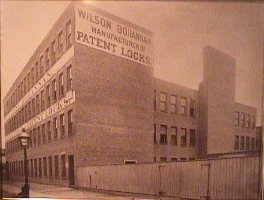
"If a man write a better book, preach a better sermon, or make a better mouse-trap than his neighbor,
though
he build his house in the woods the world will make abeaten path to his door."
***This piece was taken from the forward
section of an early Wilson Bohannan catalog.
***Special thanks to Joe Kingsmill for
providing the Gibson & Bohannan stagecoach lock.